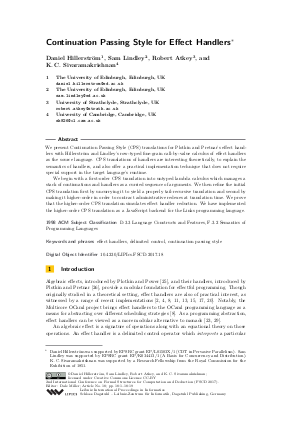Continuation Passing Style for Effect Handlers
Authors Daniel Hillerström, Sam Lindley, Robert Atkey, K. C. Sivaramakrishnan
-
Part of:
Volume:
2nd International Conference on Formal Structures for Computation and Deduction (FSCD 2017)
Part of: Series: Leibniz International Proceedings in Informatics (LIPIcs)
Part of: Conference: Formal Structures for Computation and Deduction (FSCD) - License:
 Creative Commons Attribution 3.0 Unported license
Creative Commons Attribution 3.0 Unported license
- Publication Date: 2017-08-30
File

PDF
LIPIcs.FSCD.2017.18.pdf
- Filesize: 0.73 MB
- 19 pages
Document Identifiers
Subject Classification
Keywords
- effect handlers
- delimited control
- continuation passing style
Metrics
- Access Statistics
-
Total Accesses (updated on a weekly basis)
0PDF Downloads0Metadata Views
Abstract
We present Continuation Passing Style (CPS) translations for Plotkin and Pretnar's effect handlers with Hillerström and Lindley's row-typed fine-grain call-by-value calculus of effect handlers as the source language. CPS translations of handlers are interesting theoretically, to explain the semantics of handlers, and also offer a practical implementation technique that does not require special support in the target language's runtime. We begin with a first-order CPS translation into untyped lambda calculus which manages a stack of continuations and handlers as a curried sequence of arguments. We then refine the initial CPS translation first by uncurrying it to yield a properly tail-recursive translation and second by making it higher-order in order to contract administrative redexes at translation time. We prove that the higher-order CPS translation simulates effect handler reduction. We have implemented the higher-order CPS translation as a JavaScript backend for the Links programming language.
Cite As Get BibTex
Daniel Hillerström, Sam Lindley, Robert Atkey, and K. C. Sivaramakrishnan. Continuation Passing Style for Effect Handlers. In 2nd International Conference on Formal Structures for Computation and Deduction (FSCD 2017). Leibniz International Proceedings in Informatics (LIPIcs), Volume 84, pp. 18:1-18:19, Schloss Dagstuhl – Leibniz-Zentrum für Informatik (2017)
https://doi.org/10.4230/LIPIcs.FSCD.2017.18
BibTex
@InProceedings{hillerstrom_et_al:LIPIcs.FSCD.2017.18,
author = {Hillerstr\"{o}m, Daniel and Lindley, Sam and Atkey, Robert and Sivaramakrishnan, K. C.},
title = {{Continuation Passing Style for Effect Handlers}},
booktitle = {2nd International Conference on Formal Structures for Computation and Deduction (FSCD 2017)},
pages = {18:1--18:19},
series = {Leibniz International Proceedings in Informatics (LIPIcs)},
ISBN = {978-3-95977-047-7},
ISSN = {1868-8969},
year = {2017},
volume = {84},
editor = {Miller, Dale},
publisher = {Schloss Dagstuhl -- Leibniz-Zentrum f{\"u}r Informatik},
address = {Dagstuhl, Germany},
URL = {https://drops.dagstuhl.de/entities/document/10.4230/LIPIcs.FSCD.2017.18},
URN = {urn:nbn:de:0030-drops-77394},
doi = {10.4230/LIPIcs.FSCD.2017.18},
annote = {Keywords: effect handlers, delimited control, continuation passing style}
}
Author Details
References
-
Andrew W. Appel. Compiling with Continuations. Cambridge University Press, 1992.

-
Andrej Bauer and Matija Pretnar. Programming with algebraic effects and handlers. J. Log. Algebr. Meth. Program., 84(1):108-123, 2015.

-
Bernard Berthomieu and Camille le Moniès de Sagazan. A calculus of tagged types, with applications to process languages. In Workshop on Types for Program Analysis, 1995.

-
Edwin Brady. Programming and reasoning with algebraic effects and dependent types. In ICFP, pages 133-144. ACM, 2013.

-
Ezra Cooper, Sam Lindley, Philip Wadler, and Jeremy Yallop. Links: Web programming without tiers. In FMCO, volume 4709 of LNCS, pages 266-296. Springer, 2006.

-
Olivier Danvy and Andrzej Filinski. Abstracting control. In LISP and Functional Programming, pages 151-160, 1990.

-
Olivier Danvy and Lasse R. Nielsen. A first-order one-pass CPS transformation. Theor. Comput. Sci., 308(1-3):239-257, 2003.

-
Stephen Dolan, Leo White, K. C. Sivaramakrishnan, Jeremy Yallop, and Anil Madhavapeddy. Effective concurrency through algebraic effects. OCaml Workshop, 2015.

-
Cormac Flanagan, Amr Sabry, Bruce F. Duba, and Matthias Felleisen. The essence of compiling with continuations. In PLDI, pages 237-247. ACM, 1993.

-
Yannick Forster, Ohad Kammar, Sam Lindley, and Matija Pretnar. On the expressive power of user-defined effects: Effect handlers, monadic reflection, delimited control. Proc. ACM Program. Lang., 1(ICFP), September 2017.

-
Daniel Hillerström and Sam Lindley. Liberating effects with rows and handlers. In TyDe@ICFP, pages 15-27. ACM, 2016.

-
Gérard P. Huet. The zipper. J. Funct. Program., 7(5):549-554, 1997.

-
Ohad Kammar, Sam Lindley, and Nicolas Oury. Handlers in action. In ICFP, pages 145-158. ACM, 2013.

-
Andrew Kennedy. Compiling with continuations, continued. In ICFP, pages 177-190. ACM, 2007.

-
Oleg Kiselyov and Hiromi Ishii. Freer monads, more extensible effects. In Haskell, pages 94-105. ACM, 2015.

-
Oleg Kiselyov and KC Sivaramakrishnan. Eff directly in OCaml. ML Workshop, 2016.

-
Daan Leijen. Type directed compilation of row-typed algebraic effects. In POPL, pages 486-499. ACM, 2017.

-
Paul Blain Levy, John Power, and Hayo Thielecke. Modelling environments in call-by-value programming languages. Inf. Comput., 185(2):182-210, 2003.

-
Sam Lindley and James Cheney. Row-based effect types for database integration. In TLDI, pages 91-102. ACM, 2012.

-
Sam Lindley, Conor McBride, and Craig McLaughlin. Do be do be do. In POPL, pages 500-514. ACM, 2017.

-
Marek Materzok and Dariusz Biernacki. Subtyping delimited continuations. In ICFP, pages 81-93. ACM, 2011.

-
Marek Materzok and Dariusz Biernacki. A dynamic interpretation of the CPS hierarchy. In APLAS, volume 7705 of LNCS, pages 296-311. Springer, 2012.

-
Eugenio Moggi. Notions of computation and monads. Inf. Comput., 93(1):55-92, 1991.

-
Gordon D. Plotkin. Call-by-name, call-by-value and the lambda-calculus. Theor. Comput. Sci., 1(2):125-159, 1975.

-
Gordon D. Plotkin and John Power. Adequacy for algebraic effects. In FoSSaCS, volume 2030 of LNCS, pages 1-24. Springer, 2001.

- Gordon D. Plotkin and Matija Pretnar. Handling algebraic effects. Logical Methods in Computer Science, 9(4), 2013. URL: http://dx.doi.org/10.2168/LMCS-9(4:23)2013.
-
Matija Pretnar. An introduction to algebraic effects and handlers. Electr. Notes Theor. Comput. Sci., 319:19-35, 2015. Invited tutorial paper.

-
Didier Remy. Syntactic theories and the algebra of record terms. Technical Report RR-1869, INRIA, 1993.

-
Philip Wadler. The essence of functional programming. In POPL, pages 1-14. ACM, 1992.

